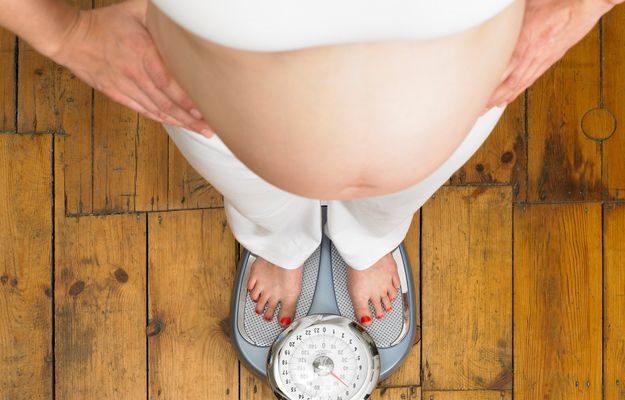
Most pregnant women will gain weight during pregnancy, in fact, it's almost inevitable.
But with the media's obsession with pregnant celebrities and their post-baby bods, pregnant women are gaining more pressure to maintain their figures, even while pregnant. Comments like, "You're hardly showing, I wouldn't have known you're that far along!" have become widely excepted.
For expecting mothers with a history of eating disorders, the weight gain may trigger the disorder to resurface. Pregorexia is a portmanteau of the words pregnant and anorexia and it is defined as having an intense obsession with weight while pregnant.
Also, read: Pregorexia, the pregnancy eating disorder
"I've never known an eating disorder to manifest during pregnancy," says Pam Goodman, an addictions counsellor who specifically works with patients suffering from eating disorders. "This disorder will most likely happen to pregnant women with a history of eating disorders or body dysmorphia."
However, not all women with a history of disordered eating will develop pregorexia when they are pregnant, she says. Some embrace all the ups and downs of pregnancy.
Pam explains that pregorexia would be treated in the same way as any other eating disorder, but more caution would be taken to ensure that both the baby and mother remain healthy.
How much can I expect to gain in a healthy pregnancy?
- If you were underweight when falling pregnant (BMI less than 18.5) you should gain 13-18kg.
- Women of normal weight (BMI 18.5-24.9) should gain 11-16kg.
- Overweight women (BMI 25-29.9) should gain 7-11kg and obese women (BMI 30 and above) should aim for 5-9kg.
Also read: What you need to know about pregnancy weight gain
"It's not that I didn't love my daughter"
In a 2013 interview with the Daily Mail, mom of two Maggie Baumann recalls her experience with having an eating disorder while she was pregnant. During her second pregnancy, she vowed to not gain weight like she did in her first one. She managed to only gain 8kg compared to the 14.5kg she had gained while she was pregnant with her first child.
She was exercising daily and avoiding food. By her third trimester, doctors encouraged her to stop, fearing that the baby would be born underweight and malnourished. Their caution fell on deaf ears and she continued to exercise in secret. "I was like, 'Oh well, I won't go to the gym... I'll just go and exercise somewhere else. I'm doing what I'm supposed to be doing but not really.'" As a result, her child suffered from seizures during infancy.
She was met with tons of criticism for speaking out about her experience, with many readers labelling her a bad mother. Now, two decades have passed since her second pregnancy and she works as an eating disorder specialist. “It’s not like I didn’t love my daughter, or didn’t want to take care of her when she was still in my womb. But because I had anorexia, I couldn’t make rational and healthy decisions while I was pregnant, both for myself and her,” she explains.
Also, read: Is it ever safe to try to lose weight while you’re pregnant?
What happens when you don't eat enough nutritious food in pregnancy
When you severely restrict your food intake, or binge and purge while you're pregnant, your baby will not receive the necessary nutrients it needs to develop in the womb.
- Your baby may be born underweight and develop other health complications during infancy.
- You will also likely be fatigued.
- The lack of nutrients to your baby may hamper their growth and development which may later result in serious health conditions.
- For some women, pregorexia may lead to a miscarriage.
If you think you may have pregorexia or worry that it may develop because of your history with eating disorders, talk to your doctor or an eating disorder specialist.
Women should not be shamed for this condition; it doesn't make them bad mothers, they are fighting a battle. Instead we should talk about it more so the disorder can be better understood and destigmatised.
Carrying a child and giving birth is not an easy feat, so do not put any pressure on yourself to shrink your waistline after or during pregnancy.
For more information on eating disorders contact:
- RecoverySpace
- South African Depression and Anxiety Group
- Imani
- Akeso Behavioural Healthcare Group
- TherapyRoute
Sources: Tonic, Huffington Post, Daily Mail, Parents
Have you suffered from pregorexia? Email us at chatback@parent24.com and we may publish your comments anonymously.
Read more:
Sign up for our weekly newsletter to receive Parent24 stories directly to your inbox.




 Publications
Publications
 Partners
Partners














